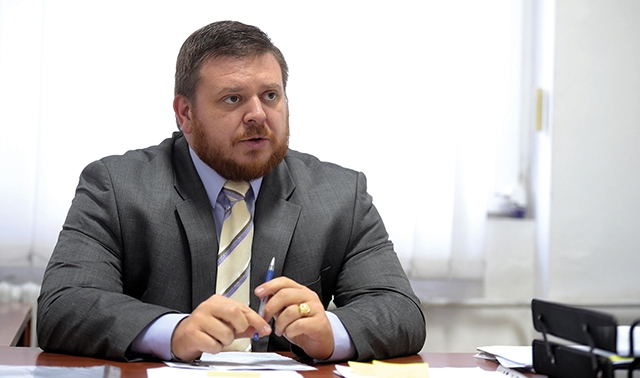NATO Membership: The Macedonian Experience
Interview
As the North Atlantic Alliance welcomed Macedonia as its 30th member country, The Georgian Institute for Security Policy spoke to Professor Alexandar Natsev in Skopje to discuss the both the journey and future implications that Macedonia’s NATO membership entails. Our first question concerned Georgia. We asked: While Georgia and Georgians would no doubt heartily congratulate you and your country on its accession, they might still wonder when their time will come. We don’t differ much in democracy rankings and reforms, and Georgia has put in a considerable shift in Afghanistan and Iraq. But despite that hard work, we still seem to be unable to step into NATO’s open door. What’s your take on this?
“That’s a pretty good question,” Natsev answered. “It should be looked into via a geopolitical context. I know Georgia is pretty active in a lot of peace operations; one of the biggest contingents in Afghanistan actually came from Georgia, and there was always an offer to enlarge this contingent, to send even more soldiers. I think the open door policy of NATO still stands, but the allies have to take into account numerous geopolitical implications; Georgia’s proximity to Russia and everything that happened is a serious obstacle to proceeding forward; its close proximity to Russia puts it in a Russian area of influence for some allied countries. The answer to your question is that Georgia is mainly suffering for geopolitical reasons. That is why it is not yet a NATO country, which also applied to us because if we had not had this political problem with Greece, we would have become a member in 2008.”
More than two-decades of waiting and finally, you’re a NATO member. What’s the feeling inside the country?
Indeed, we have been waiting 27 years for it. It started in 1993 with the unanimous decision of the Republic of Macedonia to join NATO. And today there’s a wide political, social consensus in our society; the vast majority of political parties are for NATO and EU membership. Maybe there was a slight disappointment in the country in 2008, you know, the Bucharest Summit, when we were blocked by Greece and we did not become a member, despite us probably being the most prepared country to join.
Greece hasn’t changed its stance regarding the name of the country. Does the price that your country had to pay weigh heavily on Macedonian society’s mind?
After the Bucharest Summit in 2011, we made a case at the International Court of Justice in the Hague and in 2011 the court ruled in favor that Greece had violated the interim accord which was signed between our two countries in 1996 and which stated that Greece would not block Macedonia’s accession into international organizations. The ICJ reached a verdict which said explicitly that Greece had no right to block the accession to NATO in 2008. But still it was just a judicial decision and had no political implications; so we had to wait until 2018 when we signed the Prespa agreement which actually resolved the naming issue and we had the opportunity to continue our NATO integration process. What is interesting here is that before the agreement was signed, there was a massive campaign from the government which is still ruling, that there should be a referendum; most people boycotted it and it failed; but then the government tried to find a 2/3 majority in parliament for the agreement to be adopted with Greece. They pushed and finally got 81 votes; that’s how this agreement came to life; there was a big disappointment, there was a massive protest against the decision, but it was recognized by the international community. The opposition, however, claims that this agreement contains too many concessions and when they come to power they will try to rectify some of these injustices. To be frank, that agreement was made in a pretty exhibitionist manner by the ruling party because they had no strategy to solve the problem.
What do you expect Russia’s reaction will be at seeing yet another Balkan country acceding into NATO? Do you expect any repercussions?
No. Since they enjoy a rather limited influence here, they have been quite diplomatic when it comes to this matter. Earlier this year, there were some leaked documents which came from a meeting between the representatives of the MFA and the previous Russian ambassador; he was heard speaking harshly about our joining NATO, future implications, and that it will be a legitimate target for Russia’s operations. But I expect nothing significant because Russia does not have a lot of backing here in the public; they have an embassy with a small number of staff but not a lot of diplomats. In essence, they did not and do not have a voice to share with the public about our NATO enlargement. So, no, we don’t expect things to get complicated in that matter with Russia.
How does Macedonia becoming a NATO member country affect the Balkan security architecture?
I think in the Balkans, the situation is not going to change drastically because fortunately most of our neighboring countries are already NATO members: Albania is a member, Greece is, Bulgaria is. Only Serbia has declared it is not seeking NATO membership but their strategic objective is to be NATO’s partner; Croatia is here, Slovenia is here; almost all the countries and regional powers. Turkey is also a member; Bosnia is an official partner; so when it comes to the region, I think everyone here is pro-NATO, apart from Serbia because of their bitter history with bombings and the fact they still can’t get public support to ask for NATO membership. In terms of the changing security architecture here, I’m not expecting any big changes.
By Vazha Tavberidze













